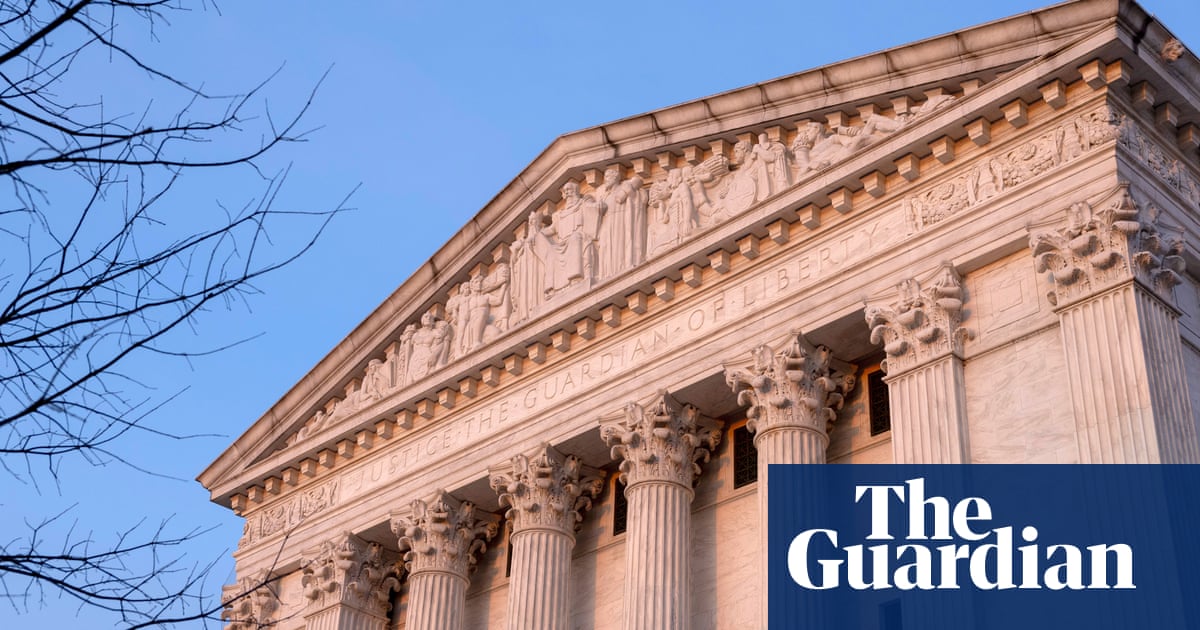
US supreme court justices appeared to stop short of approving a further unraveling of the country’s already lax gun laws on Tuesday, as the Department of Justice put up a spirited defense of regulations that prevent firearms falling into the hands of dangerous domestic abusers.
Elizabeth Prelogar, the US solicitor general, made a passionate call for the preservation of a 1994 ban on people under domestic violence restraining orders having guns.
“All too often, the only difference between a battered woman and a dead woman is the presence of a gun,” she told the nine justices.
The justices were hearing arguments in United States v Rahimi, one of the major cases of the 2023-24 judicial term. The case is being closely watched as an indication of how far the highest court is prepared to go in loosening gun controls in the name of the second amendment right to bear arms.
Specifically, the court is being asked to rule on whether disarming people who are under restraining orders to keep away from their intimate partners is unconstitutional. The justice department is challenging a ruling from the fifth circuit court of appeals, the most radical rightwing appeals court in the US, which struck down the 1994 law.
Judges on the fifth circuit decided that the domestic violence ban did not square with the supreme court’s 2022 ruling, New York State Rifle and Pistol Association v Bruen, that allowed handguns to be carried in public in all but certain circumstances. Bruen, passed by the new supermajority of six hard-right justices, held that gun laws had to be in tune with the “history and tradition” of firearms regulations going back to the 18th-century founding of the US.
In Tuesday’s oral arguments, Prelogar said that the fifth circuit’s interpretation of Bruen was a “profound misreading” and warned that it had been adopted by several courts across the country. Such rulings were “clearly untenable results, they are profoundly destabilizing”.
Prelogar urged the justices to clarify the new law that they themselves had created so that the constitutional principle was clear: “You can disarm dangerous persons.”
The case focuses on Zackey Rahimi, a drug dealer who was placed under a restraining order in 2020 after he dragged his then girlfriend across a parking lot in Arlington, Texas, shooting at a bystander who tried to intervene. Rahimi was later allegedly implicated in five other separate shootings, and arrested after a pistol and a semi-automatic rifle were found in his house in breach of the gun ban.
Rahimi challenged that ban as unconstitutional.
The outcome of the Rahimi case is likely to depend on the votes of three pivotal rightwing justices: the chief justice, John Roberts, and associate justices Brett Kavanaugh and Amy Coney Barrett. Each of the three indicated misgivings about lifting the gun ban from domestic abusers.
“You don’t have any doubt that your client’s a dangerous person, do you?” Roberts asked the lawyer representing Rahimi, Matthew Wright. When Wright tried to deflect the question by asking Roberts to define “dangerous”, the chief justice riposted: “Someone who’s shooting at people, that’s a start.”
The comment elicited chuckles from the courtroom.
Kavanaugh also raised skeptical questions, wondering whether a ruling in favor of Rahimi would in turn tear down restrictions through federal background checks that had prevented the sale of 75,000 guns in the past 25 years to people on domestic violence protective orders.
At one point, Barrett appeared so frustrated with the logic deployed by Wright that she exclaimed: “I’m so confused! I thought your argument was that there was no history or tradition.”
The three liberal-leaning justices used the oral arguments as an opportunity to call for greater clarity from the bench on what the new emphasis on “history and tradition” in US gun laws actually meant.
“There seems to be a fair bit of division and confusion about what Bruen needs and requires in lower courts,” Elena Kagan said.
Ketanji Brown Jackson, the most recent recruit to the supreme court, said that it was a “caricature of Bruen” to suggest that the requirement of a “history and tradition” test meant a hunt for a precise analogous law at the time of the founding. Such a requirement would turn the second amendment into an outlier, “because there’s no constitutional right that’s dictated exclusively by whether there happened to be a parallel law on the books in 1791”.
There is much riding on the case. As Prelogar noted at the end of the hearing, “a woman who lives in a house with a domestic abuser is five times more likely to be murdered if he has access to a gun”.
A ruling on the case is expected in June.












